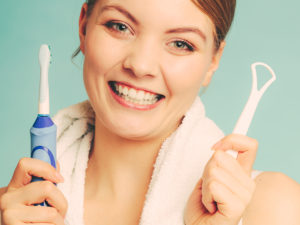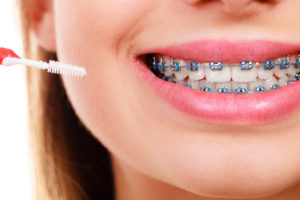By: Dr. Elizabeth Eggert

If your family is like the Eggert clan, your little ones look forward to Halloween with giddy anticipation. Even Dr. Elizabeth and Dr. Jeff have been known to sneak a piece of candy or two from their kids’ treat buckets. An occasional treat isn’t going to do much damage, but binging on Halloween candy can wreak havoc on your teeth (and your kids’ teeth, too). Here’s our list of the best and worst Halloween candy for your choppers.
Halloween Candy: The Good
Chocolate tops the list of candy that’s compatible with your teeth. It’s also one of the most popular Halloween candies. Chocolate itself isn’t sticky like many other candies, so it washes off your teeth easily.
Sugar-free candies are also excellent options. Sucking on a sugar-free lollipop or hard candy stimulates the production of saliva, which helps to wash away the food bacteria eats. Sugar-free gum is a good choice, too.
Halloween Candy: The Bad
 While sugar-free candies are good, sugary hard candies and lollipops are not. They produce saliva like their sugar-free counterparts, but the sugar from the candy gets absorbed by your saliva and washes over your teeth.
While sugar-free candies are good, sugary hard candies and lollipops are not. They produce saliva like their sugar-free counterparts, but the sugar from the candy gets absorbed by your saliva and washes over your teeth.
Sour candy is also one to avoid. These types of candies are highly acidic in addition to being sticky and coated in a layer of sugar. The acidity can break down the enamel in your teeth, leaving them at risk of cavities and gum disease.
Halloween Candy: The Ugly
But the worst culprits in your kid’s Halloween treat bucket are chewy, sticky candies. Gummy bears, fruity candy, taffy, licorice, and other sticky treats get caught between your kids’ teeth. They can linger there for days, providing a sugary feast for bacteria. That’s why chewy, sticky candies are the worst Halloween candies for your teeth.
Halloween’s a fun time, and we all enjoy a sugary treat or two from our kids’ treat buckets. Brushing, flossing, and recare appointments throughout the year can help protect your teeth during the spookiest time of year. Schedule your family’s recare appointment today.

 Does the fear of halitosis keep you up at night? If so, you’re not alone. Millions of Americans suffer from chronic bad breath. But you don’t have to suffer through this waking nightmare. Fortunately, we know many of the causes of halitosis, so we can offer you ways to treat and prevent it.
Does the fear of halitosis keep you up at night? If so, you’re not alone. Millions of Americans suffer from chronic bad breath. But you don’t have to suffer through this waking nightmare. Fortunately, we know many of the causes of halitosis, so we can offer you ways to treat and prevent it. If cavities or gum disease are causing your halitosis, it’s time to book a recare appointment with Eggert Family Dentistry. We can treat your cavities and diagnose and treat gum disease to keep bacteria at bay. Continue your care at home with regular brushing and flossing. Scraping your tongue with your tooth brush or a special tongue scraper can cut down on halitosis, too.
If cavities or gum disease are causing your halitosis, it’s time to book a recare appointment with Eggert Family Dentistry. We can treat your cavities and diagnose and treat gum disease to keep bacteria at bay. Continue your care at home with regular brushing and flossing. Scraping your tongue with your tooth brush or a special tongue scraper can cut down on halitosis, too.
 Use these miniature bottle brushes to tackle gaps or spaces between teeth, and to gently clean around and underneath your braces and wires where your brush isn’t making contact. Again, be systematic: start at one end and go all the way to the other, moving the brush between each set of brackets.
Use these miniature bottle brushes to tackle gaps or spaces between teeth, and to gently clean around and underneath your braces and wires where your brush isn’t making contact. Again, be systematic: start at one end and go all the way to the other, moving the brush between each set of brackets.
 8. Coffee
8. Coffee

 Tooth sensitivity is a common dental problem. At Eggert Family Dentistry, our patients often ask how to get rid of tooth sensitivity so they can start enjoying ice cream and coffee again. We’re happy to tell them that yes, tooth sensitivity can be treated. Often, diagnosing tooth sensitivity helps us uncover underlying oral health conditions that are also treatable.
Tooth sensitivity is a common dental problem. At Eggert Family Dentistry, our patients often ask how to get rid of tooth sensitivity so they can start enjoying ice cream and coffee again. We’re happy to tell them that yes, tooth sensitivity can be treated. Often, diagnosing tooth sensitivity helps us uncover underlying oral health conditions that are also treatable. Since the 1960s, communities across Minnesota and the United States have added fluoride to their community water supplies. Fluoridating water is an easy and cost-effective way to improve residents’ oral health. Though some consumers find the practice controversial, many
Since the 1960s, communities across Minnesota and the United States have added fluoride to their community water supplies. Fluoridating water is an easy and cost-effective way to improve residents’ oral health. Though some consumers find the practice controversial, many  Memorial Day weekend officially kicks off the summer cookout season in Minnesota. Many of us look forward to toasting grads, dads, and warmer weather with brats, cold pop, chips, and frozen treats to cool us off. But many of the cookout foods we look forward to in summer can wreak havoc on our teeth. Here are some tips on how to enjoy summer cookouts while maintaining a healthy smile.
Memorial Day weekend officially kicks off the summer cookout season in Minnesota. Many of us look forward to toasting grads, dads, and warmer weather with brats, cold pop, chips, and frozen treats to cool us off. But many of the cookout foods we look forward to in summer can wreak havoc on our teeth. Here are some tips on how to enjoy summer cookouts while maintaining a healthy smile.